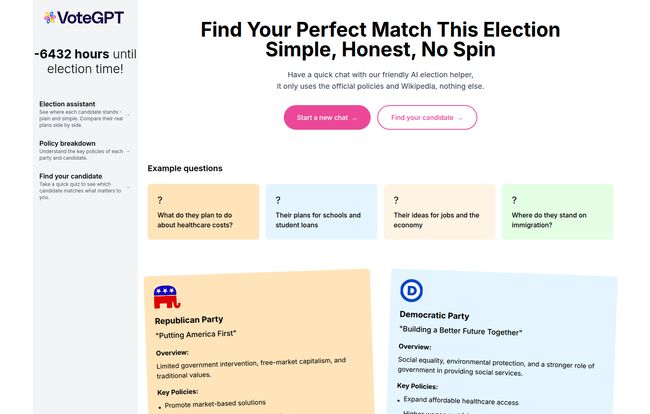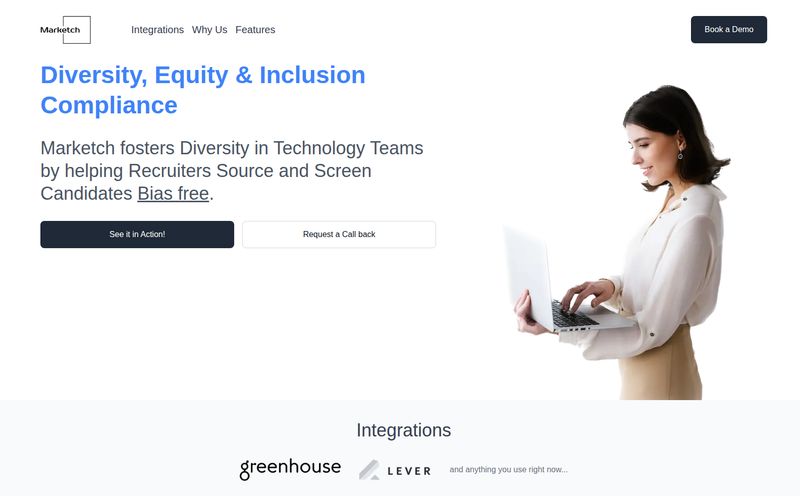Election season is a hurricane of noise. Every time I open my browser or turn on the TV, it feels like I'm getting hit with a firehose of attack ads, conflicting soundbites, and pundits yelling over each other. It’s exhausting. You want to be an informed voter, you really do, but figuring out where candidates actually stand on the issues can feel like a full-time job. It’s enough to make anyone want to just... not.
So, when I stumbled upon a new tool called VoteGPT, my inner tech geek and my exhausted-citizen-self both sat up and paid attention. The promise on its homepage is a bold one: "Find Your Perfect Match This Election. Simple, Honest, No Spin."
No spin? In politics? That’s a tall order. But in a world where we use AI for everything from writing emails to planning vacations, maybe using it to untangle politics isn't such a crazy idea after all. I decided to take a look and see if it could live up to the hype.
What Exactly Is VoteGPT?
At its core, VoteGPT is an AI-powered platform designed to be a neutral guide for voters. Think of it less as a political advisor and more as a translator. It takes the often dense and confusing world of political platforms and candidate stances and breaks it all down into plain, simple English. No jargon, no buzzwords, just the facts.
It’s built around a few key functions: you can get straightforward policy breakdowns, compare candidates side-by-side, or even take a quick quiz to see which candidates align with your own values. And the centerpiece of it all is an AI election assistant you can chat with directly.
Cutting Through the Noise: How VoteGPT Works
This was the part I was most curious about. An AI is only as good as its data, right? A biased data set leads to biased answers. So, where is VoteGPT getting its information?
The "No Spin" Data Source
According to the site, the AI only uses two sources: official policies and Wikipedia. I've gotta admit, this gave me a moment of both excitement and hesitation. Using official party and candidate platforms is a brilliant move. It's direct from the source. But Wikipedia... that's a bit of a wild card. While it’s an incredible resource (and one I use daily), its open-source nature means it can sometimes be a battleground for contentious topics—especially political ones. As the saying in the data world goes, "garbage in, garbage out." The tool's effectiveness hinges entirely on the accuracy and neutrality of those source pages.

Visit VoteGPT
Finding Your Candidate Match
The platform gives you a couple of ways to get started. You can jump into a chat with the AI and ask specific questions, like the examples they provide: "What do they plan to do about healthcare costs?" or "Their ideas for jobs and the economy." This is great for getting quick, targeted answers without having to read through a whole manifesto.
Alternatively, there’s a 2-minute quiz designed to find your match. I'm always a sucker for these things. It feels a bit like a dating app for democracy, but hopefully with a much better success rate and less ghosting.
A Hands-On Look at The Key Features
Let's break down the main offerings a bit more. The policy breakdowns are probably the most valuable feature for the average person. It takes a complex issue, like tax reform, and explains what each party or candidate proposes in a way that doesn’t require an economics degree to understand. This alone is a huge public service.
The candidate comparison tool is also incredibly practical. Seeing stances on key issues laid out next to each other makes it so much easier to spot the real differences, beyond the dramatic rhetoric you hear in ads. For anyone short on time, this is a lifesaver.
The Good, The Bad, and The AI
After playing around with it, I have some thoughts. No tool is perfect, but VoteGPT gets a lot of things right.
What I Really Liked
The biggest win here is the simplification. It successfully lowers the barrier to becoming politically informed. The clean, straightforward interface is a breath of fresh air. And the commitment to providing unbiased information, even with the caveats about its sources, is commendable. It’s a genuine attempt to bring clarity to a process that often feels intentionally obscure.
Where It Could Stumble
The dependency on its data sources is the obvious weak point. If a candidate is intentionally vague about their policies (which, let's face it, happens all the time), the AI won't have much to work with. It can't analyze what isn't there. Furthermore, its usefulness is tied to how up-to-date and complete the information is. A candidate might change their stance, or a Wikipedia page might lag behind current events. So you cant take its word as gospel; it’s a starting point for your own research, not the final word.
Who Should Use VoteGPT?
So, who is this for? I see a few key groups getting a ton of value from this.
- The Undecided Voter: If you’re genuinely on the fence and want to look at the issues without the partisan shouting, this is for you.
- The First-Time Voter: Feeling overwhelmed? This is a fantastic, non-intimidating way to get your bearings on the major players and their platforms.
- The Busy Professional: If you care about politics but don't have hours to spare for research, the quick comparisons and breakdowns are perfect.
Who is it not for? Probably the die-hard partisan who is just looking for confirmation bias. This tool is built for discovery, not for reinforcing pre-existing beliefs.
What's The Catch? The Price of Political Clarity
In the world of tech, if you're not paying for the product, you often are the product. So, what does VoteGPT cost? Based on my poking around, it appears to be completely free. I couldn't find a pricing page, and the whole project seems to be positioned as a public good. The footer even states it was "made with ❤️ for the American people." This is a huge plus, as it ensures that access to clear information isn't stuck behind a paywall.
The Verdict: Is VoteGPT a Game-Changer for Voters?
So, is VoteGPT the magic bullet that will fix political discourse? Of course not. But it doesn't have to be. What it is, is an incredibly useful tool that empowers voters to take the first, most important step: getting informed.
I like to think of it as a helpful political librarian. It won't read the books for you or tell you which one is 'best,' but it will show you where to find them, organize them neatly on the shelf, and give you a quick summary of each one. The rest of the work—the critical thinking, the weighing of values, the final decision—is still up to you. And honestly, that’s exactly how it should be.
Frequently Asked Questions about VoteGPT
- 1. Is VoteGPT truly unbiased?
- It aims to be by pulling data directly from official policies and Wikipedia. However, its neutrality is dependent on the neutrality of those sources. It's best to view it as an aggregator of information rather than an arbiter of truth.
- 2. How does the AI election assistant work?
- It uses a natural language processing model that is fed specific, approved documents—in this case, candidate policies and Wikipedia pages. When you ask a question, it searches only within that information to generate an answer, preventing it from pulling in random, unvetted opinions from the wider internet.
- 3. Is VoteGPT available for local and state elections?
- From what I can tell, the platform seems focused on major national elections (like presidential races) where candidate information is widely available. Its effectiveness for smaller, local elections would depend on whether those candidates have detailed official platforms and well-maintained public information pages, which can be hit-or-miss.
- 4. How much does VoteGPT cost to use?
- VoteGPT appears to be completely free for all users. There is no mention of a subscription, fees, or a pricing plan on their website.
- 5. Is my personal data safe with VoteGPT?
- The platform seems focused on providing information rather than collecting it. However, as with any online service, it's always a good practice to review their Privacy Policy to understand how they handle any data from your session, like quiz answers or chat history.
Conclusion
In a political climate that profits from confusion, a tool dedicated to clarity is more than just a novelty; it's a necessity. VoteGPT isn't a replacement for critical thinking, but it's an excellent supplement. It's a well-designed, easy-to-use platform that removes some of the biggest hurdles to becoming an informed voter. By making complex policies digestible and candidate stances comparable, it gives us a better chance to look past the spin and make a choice that truly feels like our own. And in any election, that's a powerful thing.



